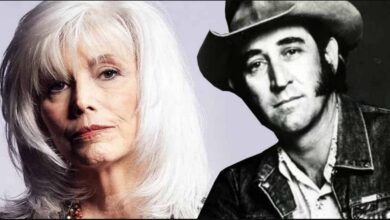His voice pained; he passed two months later, still roaring like an old lion
Johnny Cash’s final live performance, held on July 5, 2003, at the Carter Family Fold in Hiltons, Virginia, stands as a poignant milestone in the history of American music. At this deeply emotional event, Cash, despite his frail health and recent personal loss, showcased his unwavering dedication to his craft. Supported by a small band that included his son, John Carter Cash, Johnny opened the concert with his trademark introduction: “Hello, I’m Johnny Cash.” This iconic greeting resonated with the audience, setting the stage for a memorable evening filled with some of Cash’s most beloved songs.
Throughout the performance, Cash’s voice, though weathered by time and health challenges, carried a profound emotional weight. His setlist included classics such as “Folsom Prison Blues,” “I Walk the Line,” “Ring of Fire,” and “Big River,” each song imbued with the raw honesty and storytelling prowess that defined Cash’s musical career. The inclusion of Kris Kristofferson’s “Sunday Mornin’ Comin’ Down” added a reflective touch, demonstrating Cash’s ability to interpret and connect deeply with the narratives woven into songs.
A particularly touching moment during the concert was Cash’s rendition of “Angel Band,” a song famously sung by Emmylou Harris at the funeral of Cash’s beloved wife, June Carter Cash. This performance was laden with personal meaning, as Cash navigated through his grief while honoring the memory of his spouse and musical partner. Additionally, Cash surprised the audience with a heartfelt rendition of “Understand Your Man,” a song he hadn’t performed in over two decades. This choice underscored the nostalgia and introspection that permeated the evening, offering fans a rare glimpse into Cash’s personal journey through his music.
Beyond the songs themselves, Cash’s interactions with the audience revealed his deep emotional connection to his art and his listeners. He spoke openly about the presence of June’s spirit and the profound impact she continued to have on his life and music. These moments of reflection underscored Cash’s ability to merge his personal experiences with his role as a storyteller, creating a concert experience that was not only musically rich but also deeply resonant on an emotional level.
Johnny Cash’s influence on American music transcended genres, as he seamlessly blended elements of country, rock, and folk into a distinctive sound that resonated with audiences worldwide. His career spanned decades, marked by hits that explored themes of love, loss, redemption, and the human condition. Beyond his musical achievements, Cash was known for his advocacy for prisoners’ rights and his willingness to tackle social issues through his lyrics, reflecting a deep-seated commitment to justice and compassion.
In the twilight of his career, Johnny Cash’s final performance at the Carter Family Fold encapsulated the essence of his legacy: a man who persevered through personal hardships to deliver music that spoke to the soul. His voice, though physically weaker, conveyed an undeniable strength and authenticity that had defined his entire career. This concert was not merely a farewell but a testament to Cash’s enduring impact on music and culture—a legacy that continues to resonate long after his passing.
Johnny Cash’s life and career serve as an enduring testament to the power of music to transcend boundaries and touch hearts. His final performance stands as a testament to his resilience, artistic integrity, and unwavering commitment to his craft. As fans and historians reflect on his contributions to music and society, Johnny Cash remains a larger-than-life figure whose influence will continue to inspire generations of musicians and listeners alike.





